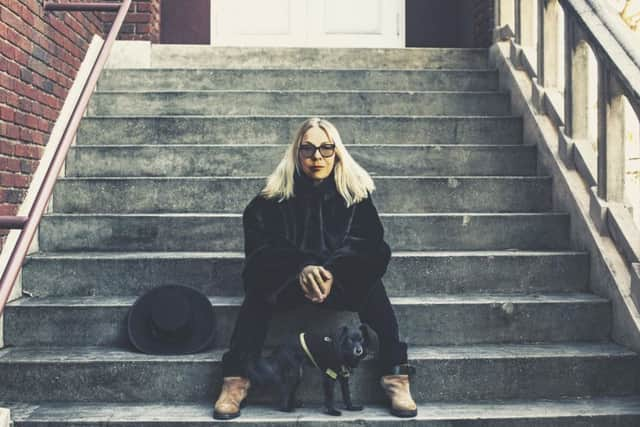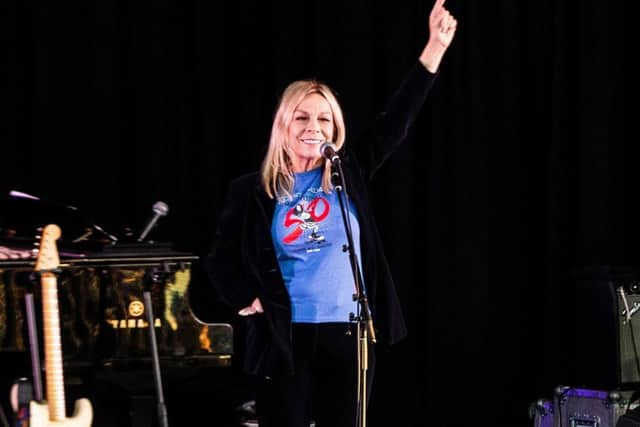Rickie Lee Jones: ‘The fact is I like my journey’


In a career full of musical twists and turns, Rickie Lee Jones has turned interpreting the songs of other writers into something of an artform.
Kicks, her latest album, is her fourth in an ongoing series of records that her own imprint onto others’ work. Where its predecessor, The Devil You Know, comprised rock songs from the 1960s and 70s by the likes of the Rolling Stones, Neil Young and The Band, this one is more eclectic, taking in everything from Bad Company to Dean Martin, America and the Benny Goodman Quartet. It was made in New Orleans, where in recent years Jones has made her home.
Advertisement
Hide AdAdvertisement
Hide Ad“I don’t know, it’s just terribly random,” the 64-year-old Chicagoan says of her song choices. “I had an idea to give every song a little bit of a Southern feel, that’s what is different, I guess, to the rest.


“I’ve never had a preconception, I’ve always found that to be a little bit false deciding before what it’s going to be, but in this case I’m so taken up by this place where I live, [I thought] ‘let’s give them all a bit of flavour and use the local guys’, so that’s what I did. I started out with the Bad Company song, because we do that live sometimes just warming up, and we liked it. I’m not associated with rock ’n’ roll stuff but I’ve always liked to defy how people see me, so that was the first one, and then we ended up with a lot of Dean Martin covers. Not very many people have done that catalogue, and we just went from there.”
Rather than any consistent themes, Jones thinks the links between the ten songs on Kicks “comes from the performance”. “It’s an inexplicable thing, there aren’t really words for it, but how I feel is what links them together,” she explains.
The Tin Pan Alley novelty song Nagasaki was written in 1928 but popularised by Benny Goodman in the ’50s. Jones says her memories of hearing “trad jazz” hark back to her father and his brother. “They’re the kids of vaudevillians,” she says. “I grew up hearing and singing that kind of thing. But Nagasaki, I didn’t hear that specific one until I was in my twenties. I didn’t learn it until I was about 21 years old.”
Advertisement
Hide AdAdvertisement
Hide AdAnother ’50s song, Cry, was a hit for Johnnie Ray. “That was a hillybilly song, that stuff wasn’t allowed in our house,” Jones laughs heartily. “I didn’t hear that until I’d grown up either. What they all have is they were on the radio, all of these songs they were on the same radio station.”
AM radio was a wonderful channel through which she discovered music when was young. “And through that I connected to the whole wide world,” she says. “I’m as much from Liverpool as I am anywhere else. I grew up practising a Liverpool accent, imagining what it was like there, just as people in England grew up practising American accents, and black – mostly bluesy – music impacted the worlds of the kids of the ’50s. They all sang like Dusty Springfield kind of voices and that heavy vibrato, maybe it comes from The Ronettes, that British female sound.
“It’s a conversation. They hear us and talk back to us, we talk back to them, and the music evolves that way, and that would only happen if it was played on the radio because we wouldn’t know what record to buy if we didn’t hear it on the radio.”
Jones moved to New Orleans eight years ago. The city has had a pronounced influence on Kicks, The Devil You Know and a 2015 album of her own songs, The Other Side of Desire. “I think these records are all about my new habitat and letting in the surround, instead of just living in a little cave inside of my head,” she says.
Advertisement
Hide AdAdvertisement
Hide AdHer association with New Orleans goes back to the early ’80s, when she worked with one of its most famous residents, the jazz musician Dr John. “Pirates was inspired by random, interesting people I met here and in San Francisco, and it was recorded in LA and New York.” She chuckles at the idea of the late Dr John being an abiding musical inspiration for her. “No, I would say he was just a friend of mine. However, friends are an abiding inspiration, but musically, maybe not so much.”
Jones sprang to fame in the singer-songwriter era of the late 1970s. Her self-titled debut album, which included the hit Chuck E’s in Love, won her a Grammy, but she remained an admirer of the interpretive singers’ craft. “I showed up at the end of the golden age of singer-songwriters and the beginning of the ‘Just Say Me’ decade but I brought with me that love of singers and that kind of understanding of the singing of the ’40s,” she says.
“I think I’ve remained a musician first and foremost, as opposed to a person shackled to a popular movement. Many people assign themselves to a cultural thing, or they’re assigned to it because of how they dress – Joe Jackson, Elvis Costello and Chrissie Hynde, all part of the British new wave or punk movement, whichever you wanted to put on them – so they have a life through that that’s outside of their music. If you’re not a part of a movement and you’re just a songwriter, like Randy Newman or myself or Laura Nyro, you’ve made your own identity.
“It’s a little harder way to go than the one who can always be sustained when people want to talk about punk, but it’s not necessarily accurate because the true meaning of jazz or punk is somebody who’s outside. Well, punk is all about the ‘it’s all about me’ thing so I could never be a punk rocker, but I think our definitions as time goes on become so small because we allow marketing people to tell us what it means, and they tell us what it means because they can sell it to us, it’s a clear, specific identity, but that’s not the truth, that’s not how we want to be, that’s not how we really see ourselves. I’m a little bit grey and I’m a little bit pink and I’m also a little bit purple, so marketing has a lot of trouble if you’re a little bit purple.”
Advertisement
Hide AdAdvertisement
Hide AdJones has also said she didn’t like the elitism of much of the singer-songwriter age and found herself kicking back against it. “I would refuse to be associated with Joni Mitchell,” she says. “I would really try, by the way I dressed and the way I acted, to make it clear that I’m not one of ‘them’ – however ‘they’ are. At 25 I saw those people as old – they were ten years older than me – and I am still often placed in their generation or age group and I think it’s because I’m a singer-songwriter and there weren’t many that came after me, so it was the end of them, but it was also the beginning of another tradition, or thing that would become a tradition, of the singer-songwriter who is not part of the genre thing.
“If I was proud of something that I feel is the most accurate, that’s the one I feel most proud of, that I’ve had the privilege and opportunity and ability to make my own way the way I saw it, or the way I see it. That’s pretty fantastic, and I’m still working. I’m really awed by it.”
Given that Jones’ career has never followed a straightforward path, does she like to keep her audience on its toes as well? “I don’t do it necessarily on purpose,” she says. “It’s a lot easier if somebody is something you can count on, that’s always the same, whether it’s musical or personal. But the fact is I like my journey, I can go somewhere and come back with some knowledge, something I didn’t know. I want to go someplace I never went before, and that’s just what I do, so I attract people who are willing to do that, they go that journey with me. Sometimes people come for one record and that’s the record they like and they don’t like the others, and that’s OK with me too. Definitely there’s something about them that they’re all a little different than the others. Well, not all, but a lot of them.”
This year marks the 40th anniversary of Jones’ debut album. Even back in the late ’70s, she says, she “hoped” she would be in music for the long term. “In 1979 it was such a big success that two things happened. I thought, ‘oh, I’ll never live this again, this is so big’ and then the other was ‘you better watch out because in five years they might not know who you are, so how are you going to level this off and make it last the long way?’ I knew I was going to have to make an even better record, a different record that was as powerful and as driving as the other one and I wasn’t sure how I could do that because you can never debut twice, so the thrill of meeting me for the first time would be gone and that would be really hard.
Advertisement
Hide AdAdvertisement
Hide Ad“I lucked out with Pirates because it was really from my heart and it was not in any way as commercial or as playable but the critics at that time were very smart people and they liked it a lot. They gave it a lot of starts which helped because they didn’t give it any radio play.”
Jones is currently working on a memoir which, she says, will be out next year. Given her complicated early life and the bohemian set she mixed with in her early years, including Tom Waits, Lowell George and Dr John, it’s a book that is eagerly anticipated. “I’ve learned I have respect for my journey and for myself that I might not have had initially,” she says of the process of retracing the steps of her life. “I think when I started the book I was defensive and by now I think it’s amazing that I did what I did, considering the background I had, it seems both as if it was destiny and an incredible accident. Not to be cliched or anything, but it’s a life well lived and a very unusual, wild life, a life that’s got a lot more in it than most people’s lives, so I’ve just been trying not to lose sight of that story by shaving off clumsy sentences and wrong verbs, and trying to keep sight of the story. It’s a great life and she lived it in her time. I know why people are buying it but when they read the larger story I hope they’re as satisfied by the larger stuff as that to do with stardom or lovers. I hope they read it and go, ‘Actually the rest of the book was even better or just as good as that part, I’m glad I read the whole thing’.”
Kicks is out now. Rickie Lee Jones plays at Leeds City Varieties on October 31. www.rickieleejones.com